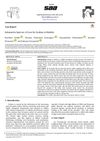 8 citations,
February 2014 in “Stem cells translational medicine”
8 citations,
February 2014 in “Stem cells translational medicine” Modified stem cells that overexpress a specific protein can improve hair growth and reduce hair abnormalities in mice.
 23 citations,
January 2008 in “Clinics in dermatology”
23 citations,
January 2008 in “Clinics in dermatology” Diet changes can help reduce acne by limiting certain hormones.
 June 2020 in “International journal of research in dermatology”
June 2020 in “International journal of research in dermatology” Taking choline-stabilized orthosilicic acid orally significantly improved hair, skin, and nail health without side effects.
 August 2024 in “Cosmetics”
August 2024 in “Cosmetics” Caffeine is beneficial for skin and hair treatments but needs better delivery methods to penetrate deeper skin layers.
 23 citations,
December 2013 in “Regenerative Medicine”
23 citations,
December 2013 in “Regenerative Medicine” Hair follicle culture helps develop new treatments for hair loss.
 June 2023 in “Small animal advances”
June 2023 in “Small animal advances” Selamectin spot-on effectively treats scabies in rabbits.
 24 citations,
January 2013 in “Indian Journal of Dermatology, Venereology and Leprology”
24 citations,
January 2013 in “Indian Journal of Dermatology, Venereology and Leprology” Hormonal treatment is effective for women with acne not helped by usual treatments, especially if they have hormonal imbalances.
9 citations,
January 2019 in “International Journal of Trichology” Combining calcipotriol with mometasone is more effective for treating alopecia areata than using mometasone alone.
 January 2012 in “Vitamins & trace elements”
January 2012 in “Vitamins & trace elements” Smoking and drinking can lower vitamin levels and potentially trigger early hair loss, but overall vitamin levels don't seem to affect hair loss duration.
 47 citations,
September 2015 in “Journal of Drug Delivery Science and Technology”
47 citations,
September 2015 in “Journal of Drug Delivery Science and Technology” Nanoparticulate systems improve drug delivery by controlling release, protecting drugs, changing absorption and distribution, and concentrating drugs in targeted areas.
 26 citations,
December 2006 in “Endocrinology”
26 citations,
December 2006 in “Endocrinology” A cream with a specific hormone blocker increases hair growth in mice.
January 2019 in “Egyptian Journal of Dermatology and Venereology /Egyptian Journal of Dermatology and Venerology” Low vitamin D levels might indicate more severe hair loss in alopecia areata patients.
 September 2023 in “Journal of Cosmetic Dermatology”
September 2023 in “Journal of Cosmetic Dermatology” Lower vitamin D levels are linked to higher CRP levels in people with a type of hair loss called alopecia areata.
11 citations,
November 2021 in “JBMR plus” The vitamin D receptor can act without its usual activating molecule, affecting hair growth and skin cancer, but its full range of actions is not well understood.
 2 citations,
May 2001 in “Current problems in dermatology”
2 citations,
May 2001 in “Current problems in dermatology” The conclusion is that effectively treating hair disorders is difficult due to the complex factors affecting hair growth and more research is needed to improve treatments.
 42 citations,
August 2013 in “International Journal of Women's Health”
42 citations,
August 2013 in “International Journal of Women's Health” Female pattern hair loss is caused by multiple factors and while treatments like topical minoxidil, hormone therapy, and low-level light therapy can help, none can fully cure it.
 79 citations,
January 2017 in “Dermatology practical & conceptual”
79 citations,
January 2017 in “Dermatology practical & conceptual” Correcting nutrient deficiencies may help with hair loss, but the benefits of supplements without a deficiency are uncertain and could be harmful.
14 citations,
January 2016 in “International Journal of Trichology” Many women with hair loss also have thyroid issues, high blood pressure, and low Vitamin D.
 15 citations,
August 2022 in “Journal of endocrinological investigation”
15 citations,
August 2022 in “Journal of endocrinological investigation” Vitamin D and calcium are important for quick and effective skin wound healing.
 262 citations,
May 2017 in “Nanomedicine”
262 citations,
May 2017 in “Nanomedicine” New nanofiber technology improves wound healing by supporting cell growth and delivering treatments directly to the wound.
 3 citations,
November 2020 in “Biological Trace Element Research”
3 citations,
November 2020 in “Biological Trace Element Research” Men with hair loss may lack zinc, copper, and vitamin D; supplements could help.
1 citations,
February 2023 in “Plants” BB4CMU rice bran oil may help treat hair loss and gray hair.
 1 citations,
January 2010 in “Springer eBooks”
1 citations,
January 2010 in “Springer eBooks” Certain micronutrients may improve hair and nail health, but more research is needed to confirm their benefits.
 6 citations,
November 2010 in “Histochemistry and cell biology”
6 citations,
November 2010 in “Histochemistry and cell biology” The proteins transthyretin and megalin are more present in the growth phase of hair, suggesting they might affect hair health and growth.

research Acne
4 citations,
January 2019 Acne is a common skin condition that can be influenced by diet, lifestyle, and hormones, and requires a treatment approach that includes psychological considerations.
 February 2024 in “Medicina-lithuania”
February 2024 in “Medicina-lithuania” Obesity and bariatric surgery can cause hair thinning and temporary hair loss due to nutritional deficiencies and stress.
 40 citations,
April 2013 in “Dermato-endocrinology”
40 citations,
April 2013 in “Dermato-endocrinology” People with chronic Alopecia Areata often have lower vitamin D levels.
13 citations,
July 2020 in “World journal of stem cells” Vitamin D and calcium are important for skin stem cell function and wound healing.
 June 2018 in “Disease-a-Month”
June 2018 in “Disease-a-Month” Remove inflamed cysts surgically, avoid topical antibiotics on wounds, treat skin and mouth conditions with specific medications, and address underlying causes of hair loss.
 100 citations,
June 2011 in “Journal of The American Academy of Dermatology”
100 citations,
June 2011 in “Journal of The American Academy of Dermatology” 5% minoxidil foam once daily works as well as 2% minoxidil solution twice daily for female hair growth and is more convenient.
























